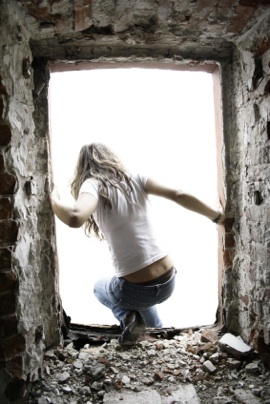 Inspiration comes from the strangest places. I often have flashbacks throughout the day to random memories and times in my life that seem to come completely out of nowhere. I let myself ponder through the things I remember about that moment before I snap back to the present and wonder, “why am I thinking about this?” Sometimes, it’s just the meanderings of memory that take me to that day in high school when I was put in charge of entering fruit orders into the computer for the FFA fund raiser. Not that I was one of the “jacket wearing” FFA members, but I did participate in our “field day” demonstrations by churning butter in a series of jars with a sweet, sandy-haired farm boy who was almost too shy to talk to me. What was his name? I don’t know. I only remember that he liked NASCAR and blushed when I teased him about being too handsome to not have a girlfriend. See? Why the heck was I thinking about entering fruit orders for the FFA fundraiser?
Inspiration comes from the strangest places. I often have flashbacks throughout the day to random memories and times in my life that seem to come completely out of nowhere. I let myself ponder through the things I remember about that moment before I snap back to the present and wonder, “why am I thinking about this?” Sometimes, it’s just the meanderings of memory that take me to that day in high school when I was put in charge of entering fruit orders into the computer for the FFA fund raiser. Not that I was one of the “jacket wearing” FFA members, but I did participate in our “field day” demonstrations by churning butter in a series of jars with a sweet, sandy-haired farm boy who was almost too shy to talk to me. What was his name? I don’t know. I only remember that he liked NASCAR and blushed when I teased him about being too handsome to not have a girlfriend. See? Why the heck was I thinking about entering fruit orders for the FFA fundraiser?
I’ve been working more regularly on a novel this summer, but I’ve been reluctant to share my progress with friends. I have the odd preference of writing in longhand for my first drafts, which means my “second draft” happens when I enter the writing into the computer. I’ve started the second draft process, but I can tell the writing is missing something. I need to add to it to make the situation believable, to make the character seem more like a real person, and to move the plot along without it feeling like it’s dragging. I have the old pang of self-doubt that strikes when I start struggling with a project, but I’m dedicated to working through it. But how?
My character is 18. She’s in the summer between high school and college. And she is in the middle of dealing with a moment of intense family turmoil. How do I bring this girl to life? How do I tell the reader who she is without banging them on the head with a list of likes and dislikes? And how do I do this without making the long-form fiction feel like it’s crawling at a snail’s pace?
Then came the a-ha moment! With a flashback, of course. OF COURSE! Why haven’t I thought of flashbacking (which may or may not be a “real” word) before now? She is not far away from being in high school, so I have to tap into my own “yesteryear” memories to remember the angst of being that age again, being in the midst of a major life transition, and how to deal with complicated relationships between siblings and parents and grandparents. But, she is not me, so I must invent a past for her. I *can* use my own mental wanderings to populate her past, though.

I remember when I was a little kid, I really thought I was a badass. It was a freer, more dangerous time, I guess, in retrospect. I played in half-constructed homes as new portions of my neighborhood were developed. One of those houses was a two-story house–a rarity in the land of one-story ranch-style homes. During an intense game of chase with two boys who were older than me (boys who kept calling me a “baby” and a “girl” like it was a slur and not just a fact of genetics), I jumped from the second-story window of the newly framed house, daring them to follow me. They did not. I remember laughing at the looks on their faces. They were looking down at me from the window, stunned that I had jumped from so high. I was all of 5 and fearless and had legs made of rubber. Ah, how sweet was that victory! I decided to give my character the same sense of “I’ll show you” daring.
Exercise:
Take 10-15 minutes to write down one of your childhood memories. Try to remember as much as you can, especially sensory memories and the way you felt, emotionally. After you’ve captured the essence of that memory, use the same “feeling” to write a new scene for your character. You can frame it as a flashback to your character’s childhood, or not. Maybe you have a character who is a child, so it could happen in “real time.” Maybe you’re character has a child. It can be translated in so many ways. Maybe it will inspire a piece of non-fiction. Maybe you won’t want to change the scene at all–you know how us writers are–always stealing from real life to tell our stories. That’s what they mean when they say, “write what you know,” right?
Happy writing!